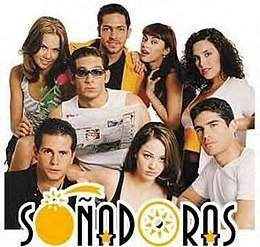Soñadoras
Soñadoras, is a Mexican telenovela produced and created by Emilio Larrosa with Rocio Taboada and Braulio Pedraza for Televisa in 1998.
| Soñadoras | |
|---|---|
 | |
| Genre | Telenovela |
| Created by |
|
| Written by |
|
| Directed by | Salvador Garcini |
| Starring | |
| Opening theme | "Soñadoras" by Sentidos Opuestos |
| Country of origin | Mexico |
| Original language(s) | Spanish |
| No. of episodes | 174 |
| Production | |
| Executive producer(s) | Emilio Larrosa |
| Producer(s) | Arturo Pedraza |
| Cinematography |
|
| Editor(s) |
|
| Release | |
| Original network | Canal de las Estrellas |
| Original release | August 31, 1998 – April 30, 1999 |
| Chronology | |
| Preceded by | Preciosa |
| Followed by | Amor gitano |
Plot
The main character of this story is Fernanda, a psychologist who works in a rehabilitation center for substance abusers. Fernanda has recently suffered a terrible tragedy, the man she was soon to marry was murdered while trying to resist a hold-up. during the assault, her father received a bullet in the spine which left him paralyzed. At the beginning of the story we realize that Eugenio de la Peña, an evil drug dealer, is in love with Fernanda and is willing to go to any extreme to make her his wife. But Fernanda meets the handsome Jose Luis, a writer and a literature teacher who works at a local private high school. Jose Luis is honest and hard working, charming and full of life. However, he carries a dark secret from his past. When Fernanda and José Luis fall in love, Eugenio gets extremely jealous, but when he decides to eliminate his rival, he discovers that his own daughter Jaqueline, is in love with José Luis. Jaqueline, on the other hand is being wooed by Manuel, who despite his popularity, cannot call Jaqueline's attention. One of Jaqueline's friends is Emilia, a romantic but realistic young girl whose dream is to become a dancer. Emilia's boyfriend is Gerardo, whom she adores. Gerardo is the lead singer in a rock band. But soon, a dancer and choreographer called Enrique enters Emilia's life and falls in love with her. Another of Jaqueline's friends is Lucía, the wealthiest of the dreamers, but also the homeliest. Lucia will fall in love with Gerardo but will be courted by Beto "Roque-feller". The colorful Beto lives in the same projects as Julieta, who becomes Lucia's best friend. Julieta is ashamed of being poor and is a bulimic. She constantly lies to her classmates about being wealthy and often brags about trips to Europe, expensive clothes etc. even though it is false. She will meet Carlos, a rich but second-rate physician. She will try to use him to pull herself out of her poverty, but eventually ends the relationship. Julieta falls for a new rich student named Ruben Barraisaba. In the beginning, he finds her annoying, but then they begin to date. Ruben begins to falls in love with Julieta but finds out she's been lying about her 'wealth' and makes the assumption that she's only with him for money, which forces him to end the relationship. Later, Julieta begins to date Beto and they develop a relationship. Meanwhile, with the help of a new student, Ana, Lucia becomes beautiful and makes a vengeful decision to get back at Gerardo for dating her out of pity. In the end, Gerardo finds out that Lucia is Adriana and is infuriated with her. They eventually forgive each other and start dating again.
Cast
Main cast
- Alejandra Ávalos as Fernanda Guzmán
- Arturo Peniche as José Luis Dueñas
- Ariel López Padilla as Enrique Bernal
- José Carlos Ruiz as Eugenio de la Peña
Also as main cast
- Arath de la Torre as Adalberto "Beto" Roque
- Eduardo Verástegui as Manuel Jr.
- Diego Schoening as Benjamín "El Terco"
- Jan as Gerardo Rinalde
- Aracely Arámbula as Jacqueline de la Peña
- Michelle Vieth as Lucía de la Macorra
- Angélica Vale as Julieta Ruiz Castañeda
- Laisha Wilkins as Emilia González
Supporting cast
- Alejandro Aragón as Dr. Carlos Muñoz
- Gustavo Rojo as Alfredo Guzmán
- Silvia Eugenia Derbez as Rosita Ruiz Castañeda
- Mónica Dossetti as Vanessa
- Antonio Miguel as Director
- Alfonso Kaffiti
- Theo Tapia as Don Manuel
- Polo Ortín as Octavio Ruiz
- Zoila Quiñones as Maité Castañeda de Ruiz
- Lupita Lara as Viviana
- Mariana Karr as Nancy González
- Rudy Casanova as David "El Cubano"
- Sergio DeFassio as Pedro Roque
- Ramón Valdés as Rodolfo
- Roberto Tello as Victorio
- Dulce as Antonia de la Macorra
Extended cast
- Irán Castillo as Ana Linares
- Kuno Becker as Rubén Berraizábal
- Mike Biaggio as Adolfo
Special participation
- Raymundo Capetillo as Horacio de la Macorra